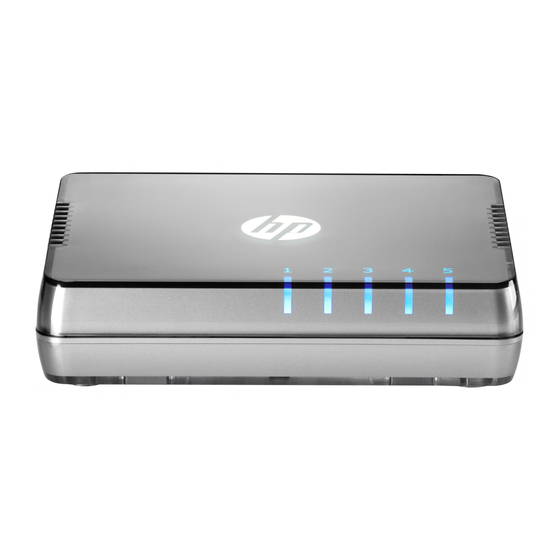- ページ 35
スイッチ HP 1405-8のPDF インストールとスタートマニュアルをオンラインで閲覧またはダウンロードできます。HP 1405-8 45 ページ。 1405 switch series
HP 1405-8 にも: クイック・スタート・マニュアル (16 ページ), インストールとスタートマニュアル (44 ページ)

Specifications
Twisted-Pair Cable/Connector Pin-Outs
N o t e
A-4
Twisted-Pair Cable/Connector Pin-Outs
The Auto-MDIX Feature: In the default configuration, "Auto", the fixed 10/
100/1000Base-T ports on the switches all automatically detect the type of port
on the connected device and operate as either an MDI or MDI-X port,
whichever is appropriate. So for any connection, a straight-through twisted-
pair cable can be used—you no longer have to use crossover cables, although
crossover cables can also be used for any of the connections. (The 10/100/
1000-T ports support the IEEE 802.3ab standard, which includes the "Auto-
MDIX" feature.)
If you connect a switch twisted-pair port to another switch or hub, which
typically have MDI-X ports, the switch port automatically operates as an MDI
port. If you connect it to an end node, such as a server or PC, which typically
have MDI ports, the switch port operates as an MDI-X port. In all cases, you
can use standard straight-through cables or crossover cables.
If you happen to use a correctly wired crossover cable, though, the switch will
still be able to automatically detect the MDI/MDI-X operation and link
correctly to the connected device.
Using Fixed Configurations. If the port configuration is changed to any of
the fixed configurations though, for example 100 Mbps/full duplex, the port
operates as MDI-X only and the correct cable type must be used: for
connections to MDI ports, such as end nodes, use a straight-through cable; for
connections to MDI-X ports, such as on hubs and other switches, use a
crossover cable.
Other Wiring Rules:
■
All twisted-pair wires used for 10 Mbps, and 100 Mbps operation must be
twisted through the entire length of the cable. The wiring sequence must
conform to EIA/TIA 568-B (not USOC). See "Twisted-Pair Cable Pin
Assignments" later in this appendix for a listing of the signals used on each
pin.
For 1000Base-T connections, all four pairs of wires in the cable must be
■
available for data transmission.
■
For 10 Mbps connections to the ports, you can use Category 3, 4, or 5
unshielded twisted-pair cable, as supported by the IEEE 802.3 Type
10Base-T standard.
